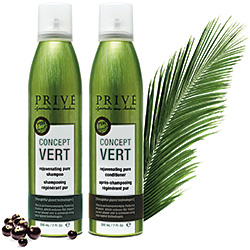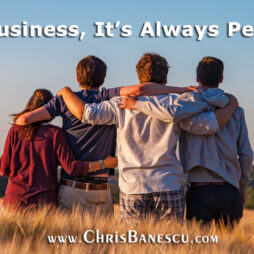 10/5/2010 – Drew Neisser –
10/5/2010 – Drew Neisser –
How petite Privé Products succeeded where giant P&G couldn’t.
Before I could even get in my first question, my hands were already covered with a soft liquid that transformed into a foamy shampoo. An excited Jackie Applebaum, the CEO of, exclaimed that “this is an unbelievable shampoo and never before has this been done in a can.” And before my hands were dry, she had me trying a non-aerosol mousse from a tiny 2.5 ounce bottle that Applebaum noted was “also blowing out the door.” This emphasis on unique products was both refreshing and enlightening, setting up this 8-point guide for small business success.
1. Create unique products to take the challenge out of marketing
With sales expected to rise 30% in 2010, obviously Applebaum is not alone in her enthusiasm for Privé’s new products. “The assignment I gave the lab is that I don’t want ‘me too’ products,” offered Applebaum. “We now have cutting edge products with cutting edge delivery systems that the market is responding to,” she added. While many small businesses feel out gunned by their larger competitors R&D departments, Privé decided that having unique products that “marketed themselves” would be the only way they could cost-effectively build their company.
2. Sometimes you have to go backward, to move forward
When Privé reclaimed the license to market its products from P&G in 2007, it made the tough decision to drop 150 salons that sold the brand. “They were not right for us so we systemically dropped them,” said Applebaum, who noted that these represented about one third of their salons at the time. Taking a hit like that is not easy for any business but it set the stage for a stronger network of salons that would actively promote Privé products as well as make themselves available for product testing down the road.
3. Don’t be afraid to ask for exclusivity
Under the P&G regime, Privé was one of many products carried by their salons. In 2010, Privé management started seeking out exclusive distribution arrangements with select salons. Noted Applebaum, “we just started this program and now have about 20 and by the end of the year maybe 50.” In addition to rooting out competitors like Bumble and Aveda, these salons provide a showcase for Privé, getting first dibs on new products and enjoying special attention from HQ. Applebaum, an acclaimed cook, even invites these salon owners over to her house when they’re in town.
4. Don’t let anyone come between you and your customers
In the salon world, many brands elect to use distributors to sell and deliver products in the U.S. One of the big downsides of this approach is “diversion,” where supposedly salon-only product ends up at mass merchants. Offered Applebaum, “we have a very strong anti-diversion program because we sell directly to the salon.” Having this kind of control means Privé’s customers, the salons, will not lose the trust of their customers, the end user of these products. Privé also support’s these salons with both personal and online training, ensuring their on-going loyalty.
5. Test new products in the real world
At the heart of the Privé brand, is Laurent D known to many as the “hairdresser to the stars.” Reported Applebaum, Laurent “is a working hairdresser who is behind the chair everyday.” “He provides the vision for the product and uses it in the field before it goes into production,” explained Applebaum. She added, “he has probably tested it for three to four weeks,” before it goes into market. This ability to test product, especially among Laurent’s celebrated clientele provides Privé with a unique advantage versus larger, corporately owned brands.
6. Invest in systems before you expand
Applebaum is as free with advice for other small businesses as she is with her product samples. “Have your house in order” she explained, referring to software systems like online ordering, inventory management and shipping. “When we went online, the salon’s weren’t used to it so we offered a free gallon of shampoo for sales ordered online,” noted Applebaum. Explaining that “the efficiency of doing [business online] has cut down our staffing needs,” Applebaum concluded “there is no other way,” to manage growth profitably.
7. Don’t be afraid to try unique promotional approaches
When we met, Applebaum showed me a picture of old shampoo bottles piled two feet high on a hairdresser’s table. Then she told me about a new promotion they were testing cheekily called, “cash for clunkers.” A smiling Applebaum explained, “We had a salon in Indiana invite their customers to bring in old bad product in exchange for 20% off new Privé products.” They sold over $4,000 worth of product in a week and even drew the attention of Senator Harry Reid who wrote the salon a letter, leading to more PR and an expansion of the program to more salons.
8. Never sacrifice your integrity
Now a family-run business, Applebaum and Laurent D hope to turn over the reigns of the company to their children some day. To ensure this possibility, Applebaum places integrity above all else. Explained a momentarily serious Applebaum, “I think our salons value our integrity, [knowing] we are only as good as our word.” Believing that this integrity starts with the product itself, Applebaum ended right where we began, showing me the entire line and emphasizing the investment they make year after year to create “the greatest products” in the market.
HT: Fast Company.


